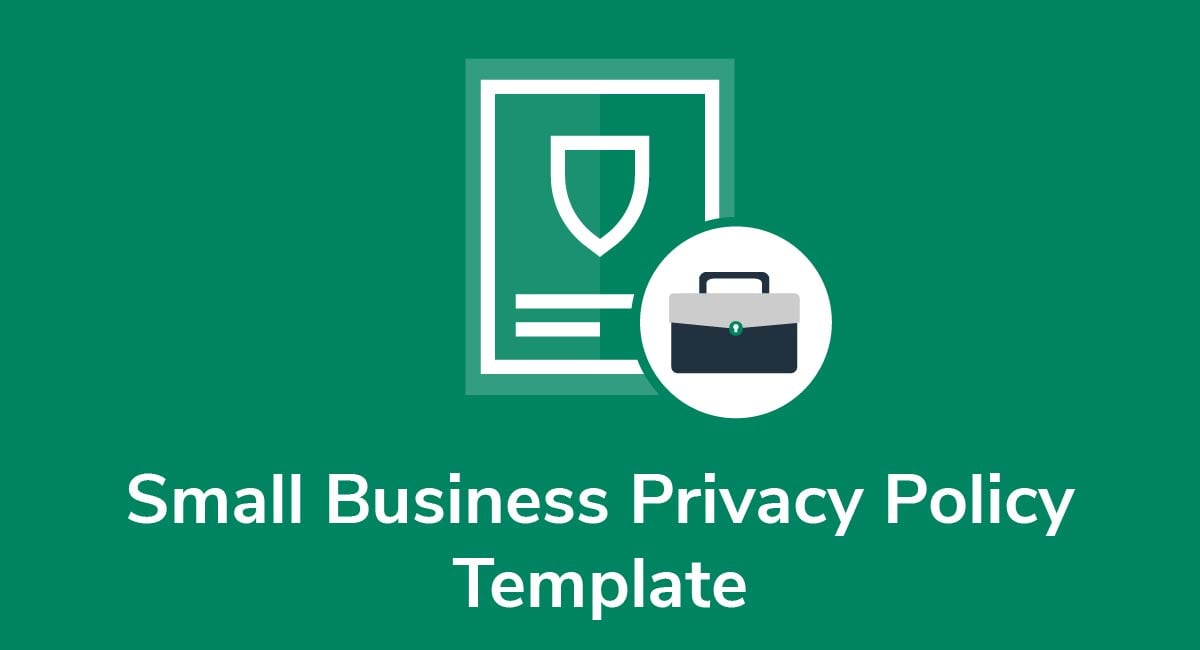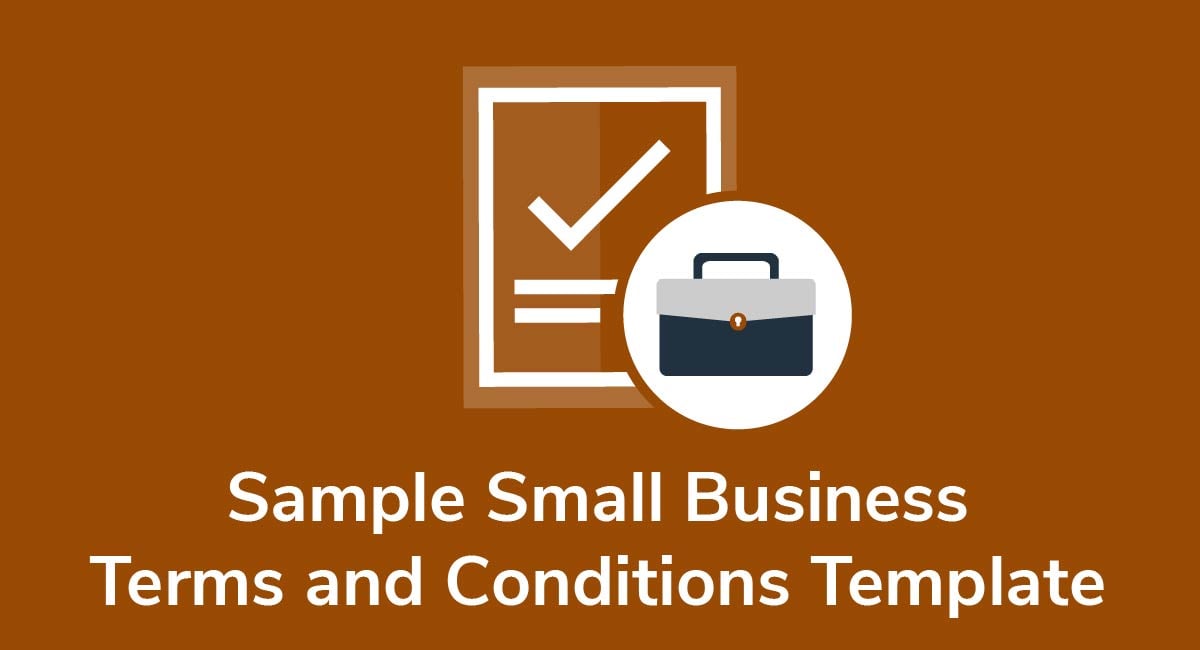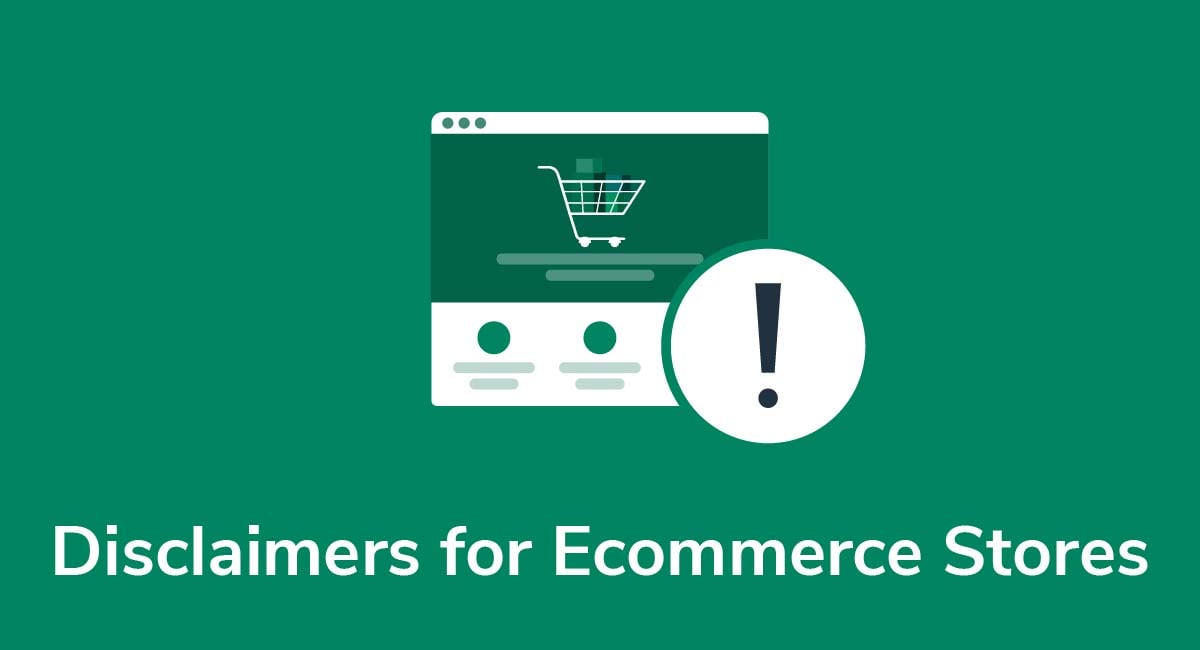Terms and Conditions for Marketplaces
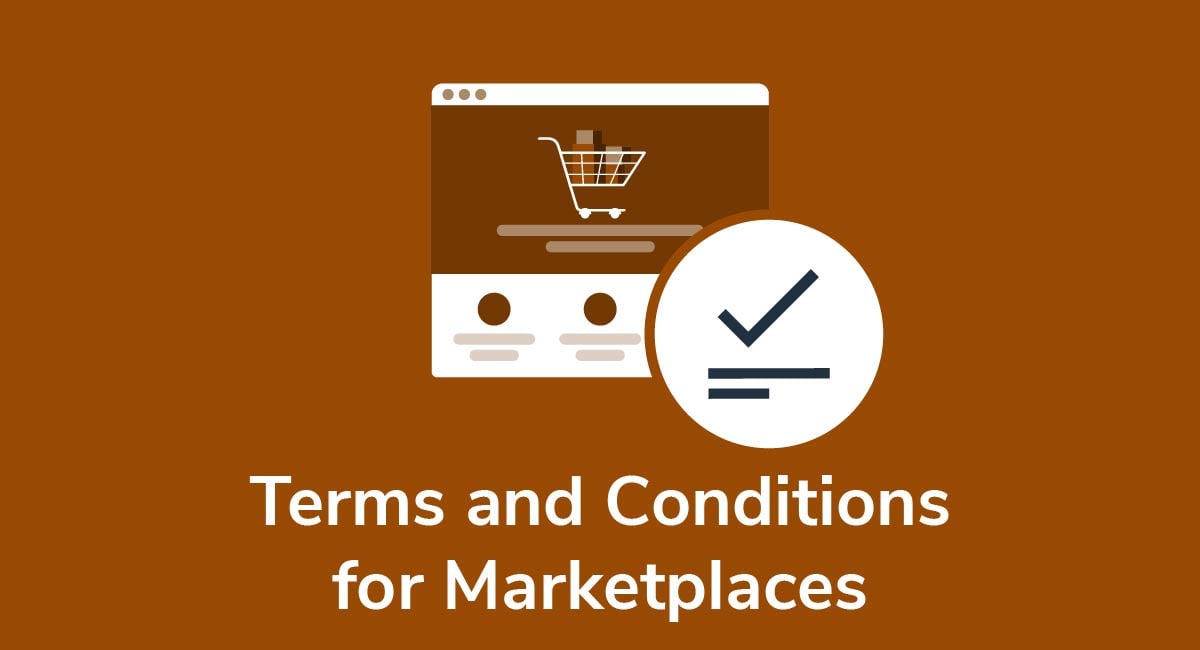
Online marketplaces connect buyers with individuals and businesses selling everything from second-hand books and original artwork to firearms and houseplants.
By some estimates, annual ecommerce revenue in the United States will top $1 trillion in the next few years.
If you're thinking about starting your own marketplace to get in on the action, you should have a rock-solid Terms and Conditions agreement to minimize risk, maintain control over your marketplace, limit your legal liability, and promote clarity for buyers and sellers.
In this article we'll cover Terms and Conditions for marketplaces from every angle and help you create and display one with ease.
Need Terms and Conditions for your business? We can help you generate a customized Terms and Conditions agreement in around two-three minutes for free. Try our Terms and Conditions Generator and just follow these steps:
- Click on the "Create your Terms and Conditions today" button.
- At Step 1, select the where will you use your Terms & Conditions and click "Next step":
- Add information about your business:
- Select the country and continue to the "Next step":
- Answer the questions about your business practices and click "Next step" when finished:
-
Enter your email address where you'd like your agreement sent and click "Generate."

You're done! Now you'll be able to instantly access and download your new agreement.
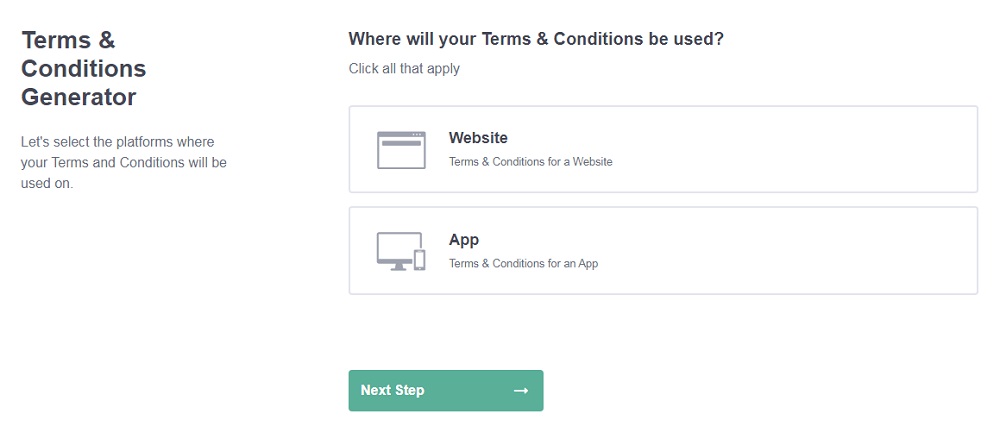
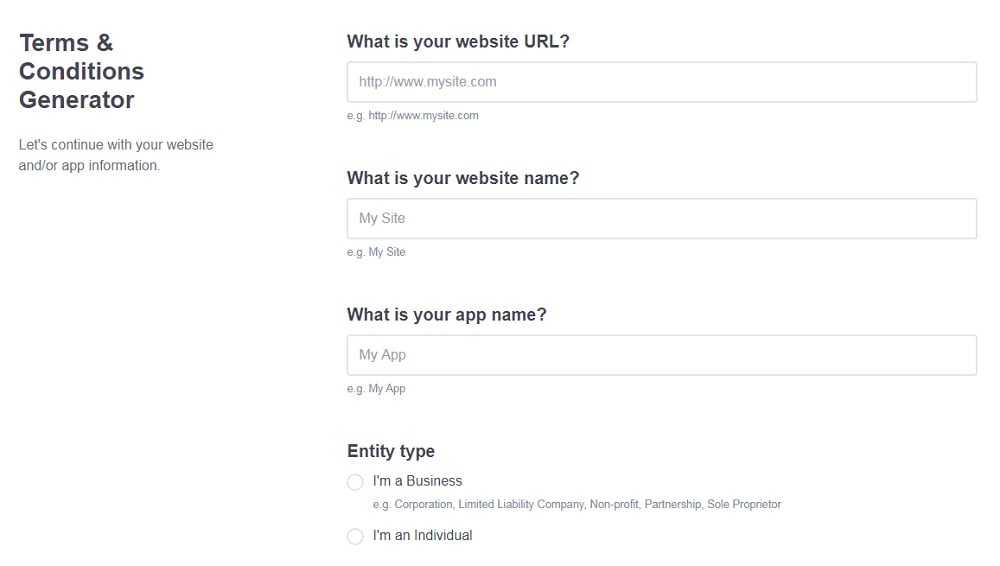
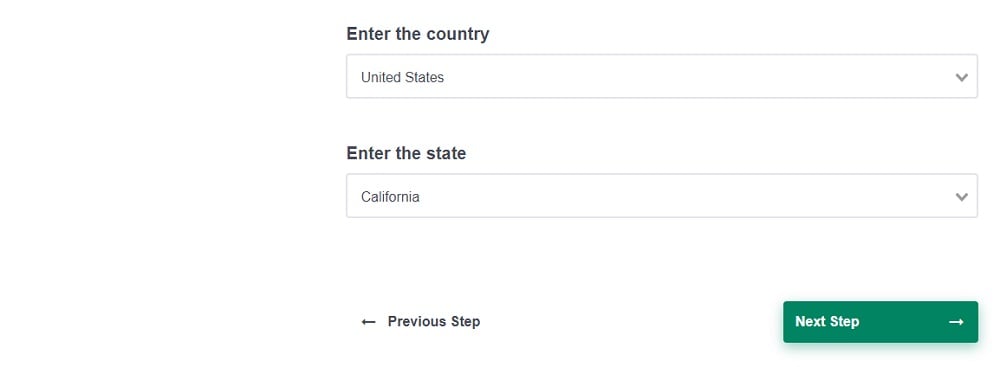
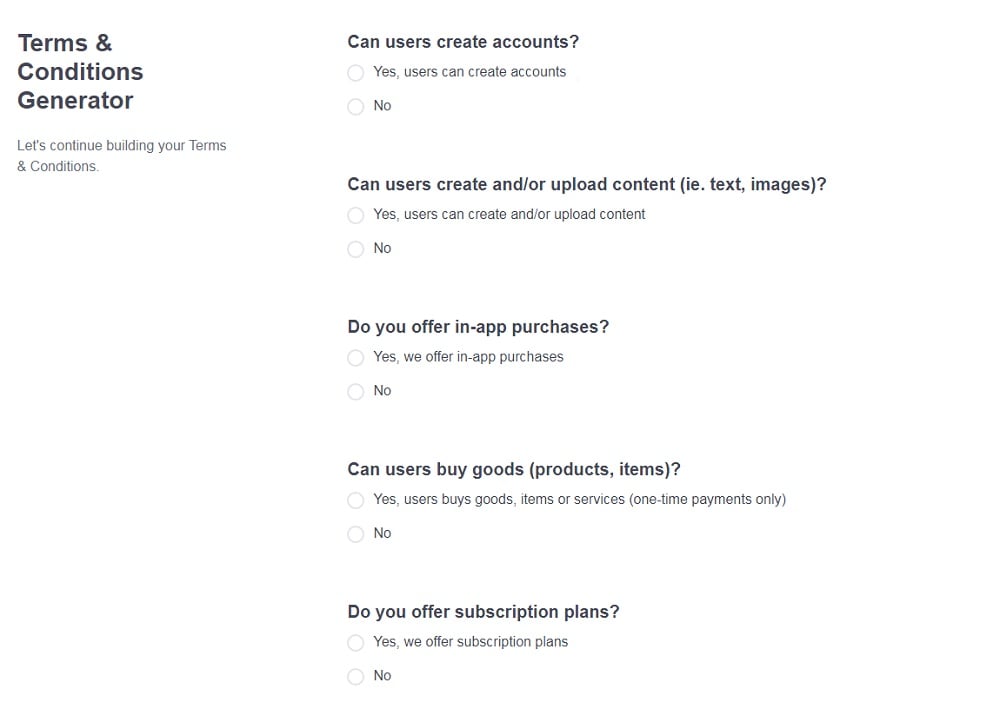
- 1. What's a Terms and Conditions Agreement?
- 2. Do I Legally Need Terms and Conditions for my Marketplace?
- 3. Why Should I Have a Terms and Conditions Agreement for my Marketplace?
- 4. What Should I Include in Terms and Conditions for Marketplaces?
- 4.1. Definitions
- 4.2. Rules and User Conduct
- 4.3. Limitation of Liability
- 4.4. Governing Law
- 4.5. Site Use Fees
- 4.6. Buyer's and Seller's Covenants
- 4.7. Seller Responsibilities
- 4.8. Site Monitoring
- 4.9. Your Role as the Marketplace Owner
- 4.10. You're Not the Seller
- 4.11. Account Termination and Suspension
- 4.12. Buyer's Protection Policies
- 5. How Do I Display and Get Agreement for Terms and Conditions for Marketplaces?
- 5.1. Website Footer
- 5.2. At Account Registration and Sign-in
- 6. Terms and Conditions for Marketplaces Summary
What's a Terms and Conditions Agreement?
A Terms and Conditions agreement (T&C) is a legal document in which you can lay out the rules, restrictions, and guidelines that apply when customers visit your website or purchase a product or service.
Note that this agreement can also be referred to as a Terms of Use, Terms of Service or other similarly named agreement.
If you own an online marketplace, your Terms and Conditions agreement will govern the relationship between you and the buyers and sellers who use your platform.
Here's an example of the table of contents from a standard T&C:
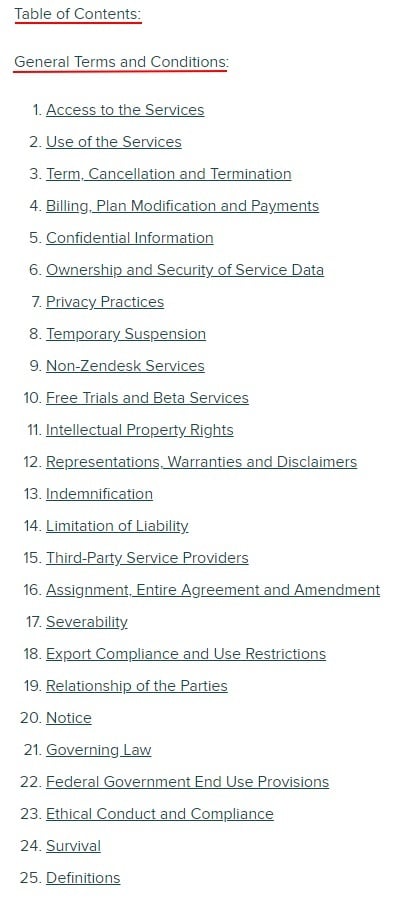
Do I Legally Need Terms and Conditions for my Marketplace?

No, you do not legally need to have a Terms and Conditions agreement for your marketplace. However, nearly all online marketplaces have one anyway because there are a number of benefits to having one.
Why Should I Have a Terms and Conditions Agreement for my Marketplace?
Well-written Terms and Conditions agreements provide clarity to buyers and sellers by letting them know what they can expect in various situations.
As a business owner, your Terms and Conditions agreement can also allow you to do the following:
- Prevent abuses by establishing ground rules and asserting your right to punish rulebreakers or terminate their accounts.
- Protect your property by addressing intellectual property and copyright issues.
- Limit your liability by stating that you aren't responsible for errors or omissions in content or for issues that arise if your site experiences an outage or other technical issues.
- Establish governing law by letting users know which laws will apply if legal issues arise between you and them.
What Should I Include in Terms and Conditions for Marketplaces?

Many Terms and Conditions agreements contain similar clauses that broadly apply to multiple industries and business types. However, you'll also need to include marketplace-specific clauses to ensure that nothing relevant gets overlooked.
First we'll cover a few general Terms and Conditions clauses.
Definitions
A great way to ensure clarity and transparency is to define terms and phrases used in your agreement.
It's important to include legal terms users may not be familiar with as well as ones that relate to ecommerce and online marketplaces specifically.
If issues arise between you and a buyer or seller, they'll have a hard time proving that they didn't understand your agreement if you've taken the time to define the terms used in it.
Gun Broker defines more than three dozen terms and phrases used throughout its agreement.
The following screenshot shows the first two entries:
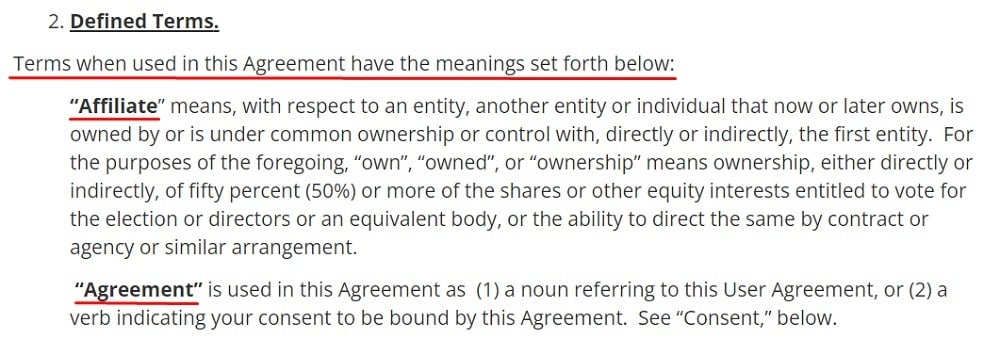
Though it may seem evident, Gun Broker also lets users know that only its definitions apply to the terms and phrases. This is important because the terms used in the agreement may be defined differently elsewhere.
Rules and User Conduct
Your Terms and Conditions agreement is the perfect place to establish ground rules and lay out a code of conduct for people wishing to engage with your membership platform, both as buyers and sellers.
Here's a portion of ArtPal's member conduct clause:
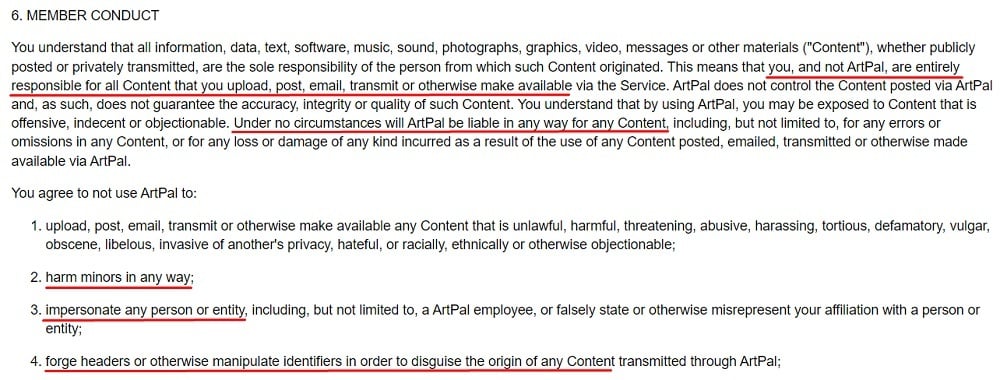
ArtPal's member conduct clause states that users, and not the company, are solely responsible for the content they upload, post, or make available.
It also prohibits the following activities:
- Harming minors
- Impersonating another person or entity
- Intentionally obscuring or altering information in a way that hides or disguises its source
Limitation of Liability
Limitation of liability clauses cap the damages (financial and otherwise) one party can recover if another party commits breaches or fails to perform as promised.
These clauses tend to be very similar by being in all caps and reading like legalese. For this clause, that's ok, as the legality of it is key.
Here's how ArtPal limits its liability:

ArtPal's limitation of liability clause states that the company isn't liable for damages of any kind even when they're caused by problems with the site.
It also makes it clear that the company isn't responsible for third party conduct or statements.
Governing Law
Since no Terms and Conditions agreement can eliminate all risk, it makes sense to establish governing law so everyone knows what laws will apply if unresolvable issues pop up.
In the following example, Gun Broker states that all matters arising from use of the website will be governed by the laws of the State of Georgia:

You'll need to choose a location that has direct connections to your business, such as where you're headquartered, or where the bulk of your business is conducted.
Site Use Fees
Many marketplace owners charge a fee for each transaction that takes place on the site. Fees may be charged to the buyer, the seller, or both.
As such, fees and other charges need to be addressed so potential users know what to expect before registering as a seller or making a purchase.
Here's how Gun Broker addresses fees:

In the last sentence of the clause, Gun Broker also links to a fees page so users can see a breakdown of all charges and fees that apply.
Fees for sold items and how to calculate them are outlined, with examples to help:
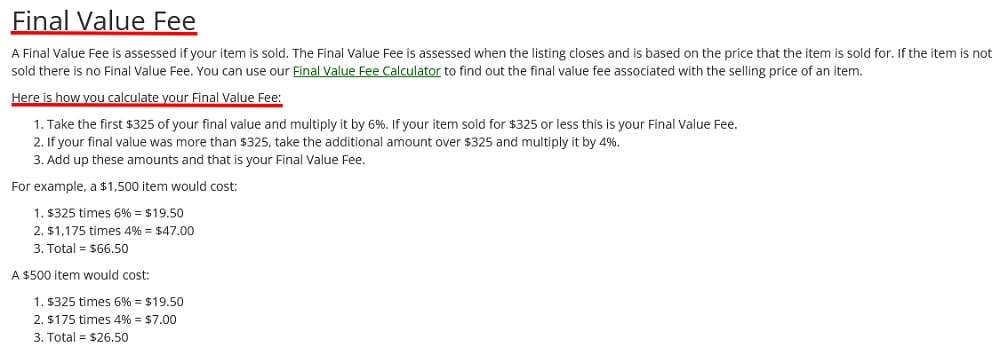
It includes a summary chart of all fees, organized by type of listing and sale, which makes it easy for people to understand what overall costs may be:
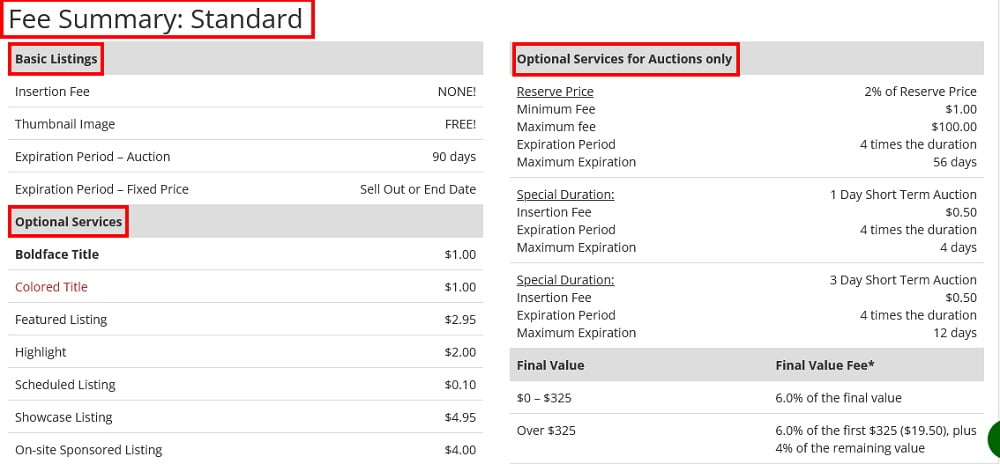
Buyer's and Seller's Covenants
Terms and Conditions agreements for marketplaces often include buyer's and seller's covenants. This is especially true with auction sites because there are often delays between when a buyer makes an offer and a seller accepts or declines it.
During this time, both the potential buyer and seller have certain obligations to one another.
This example of a seller's covenant from Gun Broker states that listing an item constitutes a binding offer to sell it to an applicable buyer at the listed price:
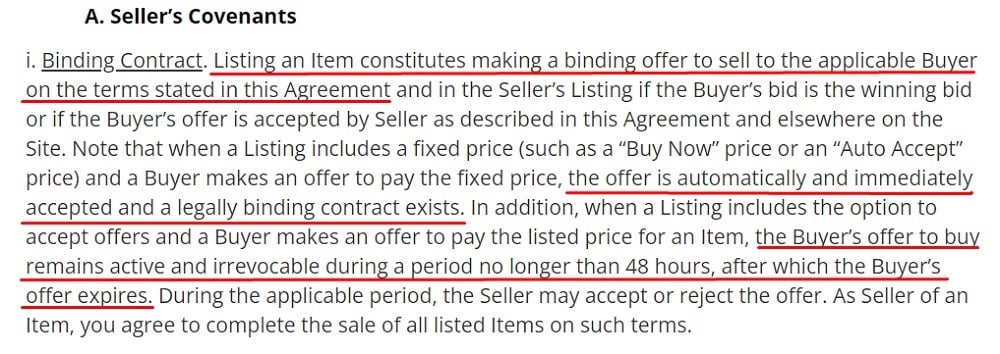
It also states that the buyer's offer is active and irrevocable for a period of 48 hours, after which it expires.
In this next example, Gun Broker states that by bidding on an item, potential buyers have created a legally binding contract with the seller in accordance with the terms set forth in the listing:

Seller Responsibilities
Inexperienced sellers may assume that they don't have many responsibilities when listing items on an online marketplace. Since this is rarely the case, most Terms and Conditions for marketplaces spell out seller responsibilities in a distinct section or subsection.
Here's how ArtPal addresses seller responsibilities:
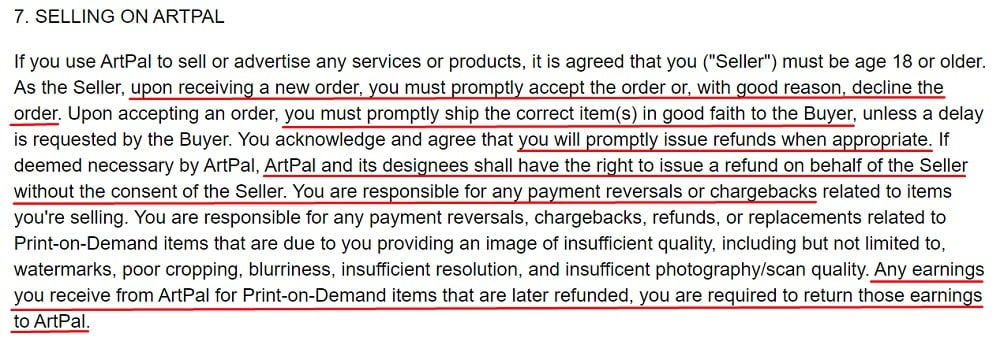
In a nutshell, ArtPal lets sellers know that they must promptly:
- Accept each order or decline it if they have a legitimate reason for doing so
- Ship the correct items
- Issue refunds when appropriate
Site Monitoring
Most online marketplaces are chock full of content posted by third parties. Since monitoring it all and verifying its accuracy would place an impossible burden on the owner, most Terms and Conditions for marketplaces let buyers know that the owner isn't responsible for third party content and that it may be inaccurate or incomplete.
Here's how Gun Broker address this issue:

Your Role as the Marketplace Owner
Some buyers and sellers may not fully understand your role as a marketplace owner. For example, a buyer may assume they're buying a product directly from your company even when the item is owned and listed by a third party seller.
To avoid issues like this, you should clearly define your role.
Here's how Gun Broker does it:
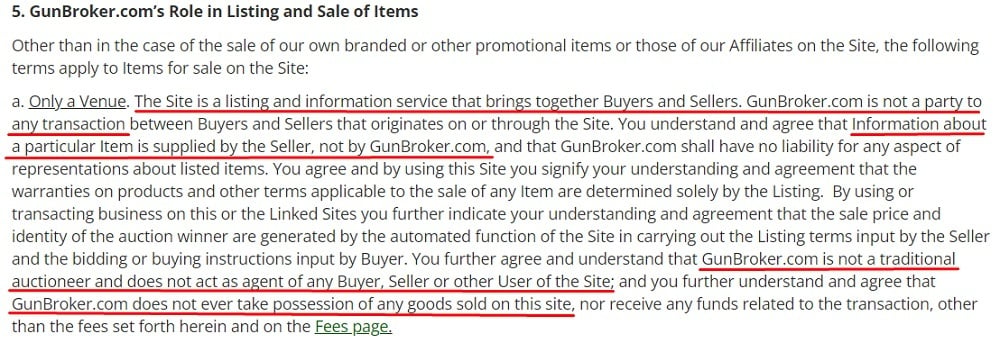
Gun Broker makes it clear that:
- The website is only a venue that facilitates transactions between third party buyers and sellers
- The company isn't a party to any transaction
- Product information is supplied by the seller
- It's not a traditional auctioneer and doesn't act as an agent for buyers or sellers
You're Not the Seller
To recap, many online shoppers incorrectly assume that they're buying a product or service directly from a marketplace. However, this is rarely the case. In fact, few online marketplaces own products or take possession of them before, during, or after a sale is made.
Instead, products and services are usually purchased from third parties that use the online marketplace as a sales platform.
Since problems can arise when this distinction isn't understood, it's worth addressing in your Terms and Conditions.
Here's how Gun Broker lets users know that it's not the seller:

Account Termination and Suspension
As a marketplace owner or operator, it's important to assert your right to suspend or terminate the accounts of users who violate rules or engage in prohibited conduct.
In some instances you may even prevent them from registering to buy or sell on your platform. You may choose to bar them from your site if they don't meet certain criteria, fail to provide adequate information, or refuse to agree to your Terms and Conditions.
The following example is from Gun Broker's User Agreement:

In this clause, Gun Broker lets users know that it reserves the right to prevent them from registering. In addition, if they are permitted to register, the company can terminate or suspend their account for any reason, with or without prior notice.
Likewise, users who can't or refuse to honor honor their covenant must:
- Immediately stop using the site
- Terminate their account
- Inform Gun Broker of the termination
Buyer's Protection Policies
Most online marketplaces have policies and programs in place that give buyers some protection if their purchase doesn't go as planned.
In some cases, sellers may intentionally or unintentionally mislead sellers, deliver a faulty product or a different product than what the seller actually purchased, or fail to deliver the product altogether.
To account for these situations and others, it's a good idea to have a detailed buyer's protection program or policy in place, and disclose it to shoppers to boost their confidence in using your marketplace.
Here's another example from Gun Broker:
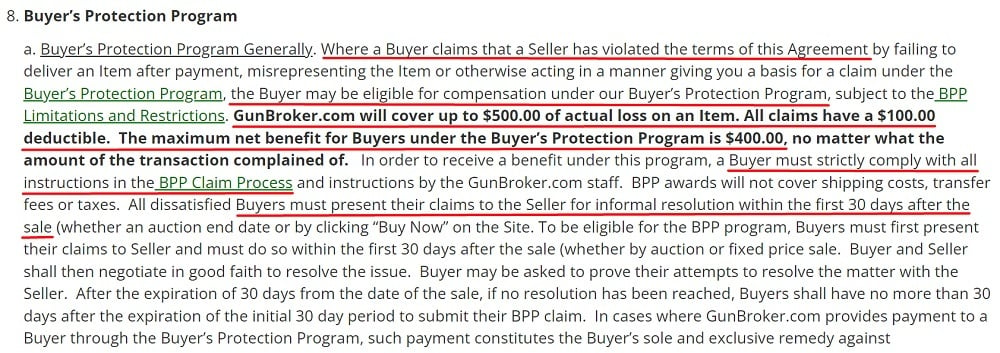
Gun Broker's maximum program benefit is $400, and all claims must be filed within 30 days of the date of the original sale.
The company also includes a number of helpful links in the clause so buyers can find the information they're looking for quickly and easily.
How Do I Display and Get Agreement for Terms and Conditions for Marketplaces?

Place your Terms and Conditions agreement in more than one location so customers can find it easily. When getting agreement, use a checkbox method to get clear, undoubtable consent.
Terms and Conditions are generally linked to in the following locations.
Website Footer
Users know to check out website footers when looking for legal agreements. Here's an example of displaying a Terms link in a website footer:

At Account Registration and Sign-in
Registration and sign-in forms are popular places to link to Terms and Conditions agreement since at these places a contract between your marketplace and the user is being formed.
In the following example, Etsy links to its Terms of Use at sign-in and lets users know that by logging in, they agree to its terms:
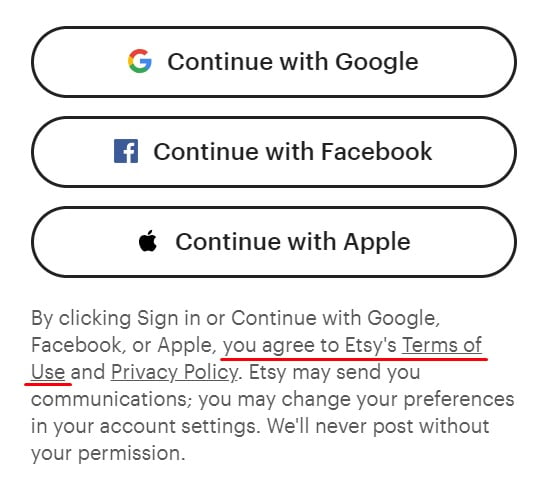
Users can click on the Terms of Use link if they want to read it in its entirety before signing up or continuing.
Here's how you can use a checkbox to get agreement to your Terms and Conditions:
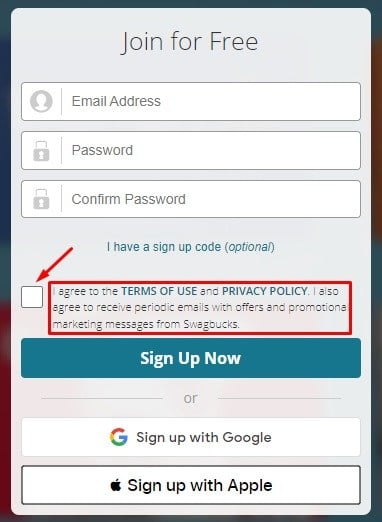
In addition, Terms and Conditions agreements may be linked to on website headers, checkout pages, mobile app listings and main menus, and on FaceBook and other social media apps and websites.
Terms and Conditions for Marketplaces Summary
If you own an online marketplace, you should have a well-written Terms and Conditions agreement.
Terms and Conditions agreements aren't legally required, but having one will allow you to spell out the rules, restrictions, and guidelines that apply when buyers and sellers interact with you and one another on your platform.
Terms and Conditions agreements provide clarity to buyers and sellers and allow you to prohibit certain behaviors, protect your property, and limit your liability.
Many Terms and Conditions agreements for marketplaces include the following sections and clauses:
- Overview
- Acceptance of terms
- Definitions
- User conduct
- Limitation of liability
- Governing law
- Fees and charges
- Buyer's and seller's covenants
- Seller's responsibilities
- Your role as the marketplace owner
Terms and Conditions for marketplaces are generally linked to on website footers and in other places where users sign up either to sell or buy on the platform.
Get users to check a box to show they agree to your Terms.
